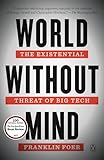World without mind : the existential threat of big tech / Franklin Foer.
Material type: TextLanguage: English Publisher: New York : Penguin Press, 2018Description: 257 pages ; 22 cmISBN:
TextLanguage: English Publisher: New York : Penguin Press, 2018Description: 257 pages ; 22 cmISBN: - 9781101981122 (paperback)
- 1101981121 (paperback)
- 303.48
- T 14.5 F654w 2018
| Item type | Current library | Home library | Collection | Shelving location | Call number | Copy number | Status | Date due | Barcode |
|---|---|---|---|---|---|---|---|---|---|
 Libro
Libro
|
Biblioteca Juan Bosch | Biblioteca Juan Bosch | Humanidades | Humanidades (4to. Piso) | T 14.5 F654w 2018 (Browse shelf(Opens below)) | 1 | Available | 00000163411 |
Browsing Biblioteca Juan Bosch shelves, Shelving location: Humanidades (4to. Piso), Collection: Humanidades Close shelf browser (Hides shelf browser)
| No cover image available |

|

|

|

|

|

|
||
| T 14.5 A173p 2024 Poder y progreso : nuestra lucha milenaria por la tecnologa̕ y la prosperidad / | T 14.5 D331b 2021 La buena tecnología : cómo la tecnología puede acelerar la reconstrucción y contribuir al bien común / | T 14.5 F654w 2017 World without mind : the existential threat of big tech / | T 14.5 F654w 2018 World without mind : the existential threat of big tech / | T 14.5 J69h 2014 How we got to now : six innovations that made the modern world / | T 14.5 R542r 2016 Rise of the machines : a cybernetic history / | T 14.5 R696t 2020 Tecnología, ¿para qué? / |
Includes bibliographical references and index.
The valley is whole, the world is one
The google theory of history
Mark Zuckerberg's war on free will
Jeff Bezos disrupts knowledge
Keepers of the big gate in the sky
Big tech's smoke-filled room
The virality virus
Death of the author
In search of the angel of data
The organic mind
The paper rebellion
Franklin Foer reveals the existential threat posed by big tech, and in his brilliant polemic gives us the toolkit to fight their pervasive influence. Over the past few decades there has been a revolution in terms of who controls knowledge and information. This rapid change has imperiled the way we think. Without pausing to consider the cost, the world has rushed to embrace the products and services of four titanic corporations. We shop with Amazon; socialize on Facebook; turn to Apple for entertainment; and rely on Google for information. These firms sell their efficiency and purport to make the world a better place, but what they have done instead is to enable an intoxicating level of daily convenience. As these companies have expanded, marketing themselves as champions of individuality and pluralism, their algorithms have pressed us into conformity and laid waste to privacy. They have produced an unstable and narrow culture of misinformation, and put us on a path to a world without private contemplation, autonomous thought, or solitary introspection-a world without mind. In order to restore our inner lives, we must avoid being coopted by these gigantic companies, and understand the ideas that underpin their success. Elegantly tracing the intellectual history of computer science-from Descartes and the enlightenment to Alan Turing to Stuart Brand and the hippie origins of today's Silicon Valley-Foer exposes the dark underpinnings of our most idealistic dreams for technology. The corporate ambitions of Google, Facebook, Apple, and Amazon, he argues, are trampling longstanding liberal values, especially intellectual property and privacy. This is a nascent stage in the total automation and homogenization of social, political, and intellectual life. By reclaiming our private authority over how we intellectually engage with the world, we have the power to stem the tide. At stake is nothing less than who we are, and what we will become. There have been monopolists in the past but today's corporate giants have far more nefarious aims. They're monopolists who want access to every facet of our identities and influence over every corner of our decision-making. Until now few have grasped the sheer scale of the threat. Foer explains not just the looming existential crisis but the imperative of resistance.


There are no comments on this title.